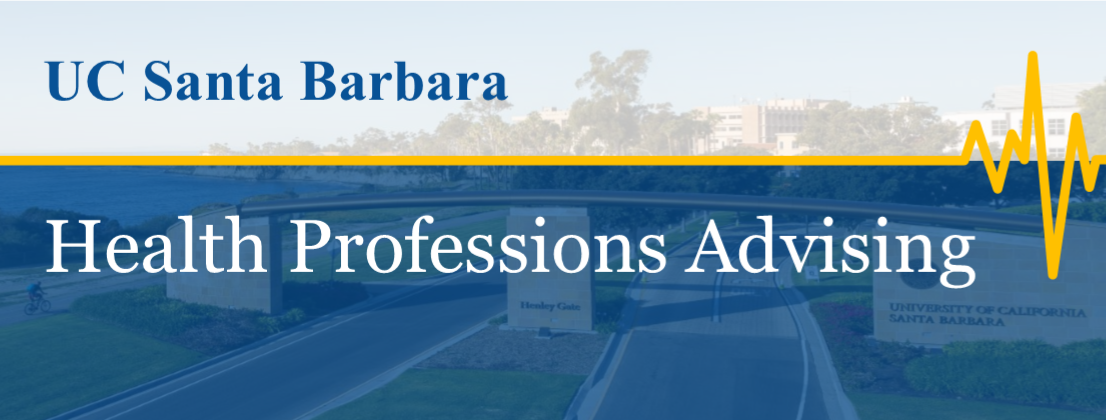UCSB Medical School Preparation Chart Click Here

For many, the pursuit of a career in medicine has been a longstanding aspiration. Some students enter college having known for many years of their desire to earn a medical degree. Other students come to the same realization much later in their academic careers.There are two types of medical training programs that you can complete in order to become a practicing physician: allopathic medicine (MD) and osteopathic medicine (DO). Learn more about the two types of physician by viewing the links below.
A Brief Guide to Osteopathic Medicine-for Students, by Students
2018 - 2019 Osteopathic Medical College Information Book (CIB)
Explore Health Careers website
PREREQUISITES: THESE ARE GENERAL PREREQUISITE COURSES THAT MOST MEDICAL SCHOOLS REQUIRE FOR ADMISSION; HOWEVER, COURSE REQUIREMENTS OFTEN VARY FROM ONE SCHOOL TO THE NEXT. ADDITIONALLY, THERE ARE SEVERAL OTHER COURSES THAT ARE NOT REQUIRED BY MEDICAL SCHOOLS, BUT ARE HIGHLY RECOMMENDED. WE ENCOURAGE ALL STUDENTS TO VISIT THE WEBSITES OF THE PROFESSIONAL SCHOOLS YOU PLAN TO APPLY TO IN ORDER TO FAMILIARIZE YOURSELF WITH EACH SCHOOL'S ADMISSION REQUIREMENTS AND PROCESS. IF YOU ARE STILL UNSURE WHETHER COURSES YOU'VE TAKEN WILL SATISFY A PARTICULAR SCHOOL'S REQUIREMENTS, PLEASE REACH OUT DIRECTLY TO THE SCHOOL.
|
Chemistry (Full Year/3 Quarters) |
CHEM 1A (4 units): General Chemistry
CHEM 1B (3 units): General Chemistry CHEM 1C (3 units): General Chemistry CHEM 2AL (2.5 units): General Chemistry Lab CHEM 2BL (2.5 units): General Chemistry Lab |
|
Biological Sciences (Full Year/3 Quarters) |
MCDB 1A (4 units): Intro. To Biology I MCDB 1B (3 units): Intro. To Biology II--Physiology MCDB 1LL (1.5 units): Intro. To Biology I Lab EEMB 2 (2 units): Intro. To Biology II—Ecology and Evolution EEMB 3 (3 units): Intro. To Biology III EEMB 2LL (1.5 units): Intro. To Biology Lab II |
|
Organic Chemistry (Full Year/3 Quarters) |
CHEM 109A (4 units): Organic Chemistry CHEM 109B (4 units): Organic Chemistry CHEM 109C (4 units): Organic Chemistry CHEM 6AL (3 units): Organic Chemistry Lab (Chemistry 109A with a minimum grade of a C-; and Chemistry 109B (may be taken concurrently)) CHEM 6BL (3 units): Organic Chemistry Lab (Chemistry 6AL and 109A with a minimum grade of C-; and Chemistry 109B). Note: Even though this lab is no longer required for MCDB/EEMB majors, whether or not you choose to take the second lab should be based on the requirements for your major and your own research into the admissions requirements at each medical school you hope to apply to. If unable to find the information on a particular program's website, email their medical school admissions office for clarification. |
|
Physics (Full Year/3 Quarters) |
PHYSICS 6A (3 units) and PHYSICS 6AL (1 units): Introductory Physics w/Lab PHYSICS 6B (3 units) and PHYSICS 6BL (1 units): Introductory Physics w/Lab PHYSICS 6C (3 units) and PHYSICS 6CL (1 units): Introductory Physics w/Lab Note: Mathematics 2A or 3A or 34A or AP Math AB Exam score of 3 or higher are required for Physics 6A. Math courses may be taken concurrently with Physics 6A. |
|
Biochemistry (1 - 2 Quarters) |
MCDB 108A (4 units). General Biochemistry (UCSB prerqs: MCDB 1A, and EEMB 2 and MCDB 1B; and Chemistry 1A-B-C; and Chemistry 109A-B-C (Chem 109C may be taken concurrently). Completion of all listed prerequisites with a grade of C or better.); MCDB and Non-MCDB majors may choose to take MCDB 110 (UCSB prerqes: Chem 1A-B-C and 109A-B, with grades of C or better, are prereqs.) Note: Many medical schools may only require a single course in Biochemistry; however, others may equate 2 quarters of Biochemistry to 1 semester of Biochemistry. Whether or not you choose to take a second Biochemistry course should be based on the requirements for your major and your own research into the admissions requirements at each medical school you hope to apply to. If unable to find the information on a particular program's website, email their medical school admissions office for clarification. |
|
Math |
|
|
English/Writing (Full Year/3 Quarters) |
Note: Each course in the AMCAS application must be classified strictly on the primary content of the course (aamc.org) (For MD Medical Schools) The AAMC Course Classification Guide categorizes the following course types as English Language & Literature (ENGL): Composition & Rhetoric, Creative Writing, and Literature. (For DO Medical Schools) The AACOMAS Applicant Guide categorizes the following courses under the English Course Subject type: Basic Composition, Composition, Creative, Writing, English, English as a Second Language, Journalism, Literature, Medical, Terminology, Poetry, Rhetoric, Technical Writing, Writing. A combination of 3 UCSB courses taken in the Writing, English, or *Comparative Literature departments should fulfill the full year of English requirement for most California medical schools. Courses that satisfy GE Areas A-1 and A-2 will satisfy the English requirement. Click here for information on these courses. *Note: According to the AAMC's Course Classification Guide, Comparative Literature courses are classified under Foreign Language, Linguistics, and Literature (FLAN) and NOT under English (ENGL). So these courses may not fulfill the full year of English required by some medical schools. Also, courses that satisfy the GE Special Subject Area Writing requirement should not be considered sufficient to satisfy the full year of English requirement. Remember, it is your responsibility to check the admissions requirements at each medical school you hope to apply to in order to make sure that the courses you take at UCSB and elsewhere will satisfy each program's specific requirements. |
|
Social/Behavioral Sciences & Humanities (2 Courses) (Highly Recommended; May be required by some programs.) |
PSY 1 and SOC 1 Note: Introductory courses in psychology and sociology are highly recommended for MCAT preparation. Some medical schools, particularly DO, may require these courses, so be sure to review the admissions requirements at each school you plan to apply to. |
| Highly recommended: Prerequisite courses listed are minimum requirements; however, most successful applicants will have exceeded the minimum requirements by taking additional upper division science courses. Examples of appropriate courses include but are not limited to: |
MCDB 101A - Molec. Genetics I MCDB 103 - Cell Biology MCDB 131 - Gen. Microbiology
|
|
If you choose not to major in one of the natural sciences, you may wish to include one or two additional science electives in your program of study if your schedule permits. *Math requirements may vary by school so be sure to research individual prerequisites. |
|
|
Sample Pre-Medical Course Schedule, Years 1 & 2 (To be used as a guide and is not intended to be strictly adhered to by all pre-med students!) |
|||||||||||
|
|
Fall Quarter |
Winter Quarter |
Spring Quarter |
||||||||
|
Year 1 |
Chem 1A Mathematics or Stats (See above) GE or Elective |
Chem 1B + 2AL Math or Stats (See above) GE or Elective GE or Elective (if you feel you can handle another course) |
· Chem 1C + 2BL · Math or Stats (See above) · GE or Elective · GE or Elective |
||||||||
|
Year 2 |
MCDB 1A Chem 109A GE or Elective GE or Elective? |
MCDB 1B EEMB 2 MCDB 1LL Chem 109B Chem 6AL (May be taken later.) |
EEMB 3 and EEMB 2LL Chem 109C Chem 6BL (May be taken later.) GE or Elective |
||||||||
|
|||||||||||
EXAM AND GPA: 
The Medical College Admissions Test (MCAT): The MCAT is a standardized examination that consists of multiple choice sections that assess your knowledge of natural and behavioral sciences. In addition to concepts from biology, general and organic chemistry, and physics, the MCAT also includes material from biochemistry, basic research and statistics, and psychology and sociology concepts. Visit the American Association of Medical Colleges (AAMC) website for more information regarding the MCAT.
You can review Situational Judgement Test report here with more information about MD programs that require situational judgement exams. The PREview and CASPer Tests are used in the admissions porcess for some schools to assess situational judgement and ethical reasoning. You can find more information about the PREview Test here. Please visit the CASPer website for more information about the CASPer test.
Grade Point Average (GPA): Minimum GPA requirements vary from program to program, but MOST competitive applicants have a 3.5 GPA cumulative GPA and 3.5 Biology, Chemistry, Physics, and Math (BCPM) GPA. The list of PSY classes that may count towards your BCPM can be found here. Additionally, most professional school programs will not accept grades of C- or below in prerequisite courses.
Transcript Review and Grade Trends: Admission committees conisder a number of factors incluidng and beyond the final grades earned in courses. For example, admission committees will review and consider the number of courses/units taken each quarter, whether courses were taken P/NP, retaken, and were withdrawn from, resulting in a W on the official transcript. To learn more about what your official transcripts communicate to admissions committees, please review the AAMC's Anatomy of an Applicant Guide. (A link to the guide can be found in the first paragraph in the Current Students section of our website.)
TIMELINE
| **Students should note that there is no set path or timeline that dictates when students have to take their admission test or apply to professional school. Professional schools DO NOT penalize students for not applying at a particular time. The timeline above is only a guide, and students should plan to meet with a pre-health advisor to discuss their individual goals and needs | ||||
|
||||
ADDITIONAL RESOURCES:
Association of American Medical Colleges Application Service (Allopathic/MD) (AMCAS) Click Here
Medical School Admissions Requirements/Program Directory (MD) Click Here
Medical School Admission Requirements- Reports for Applicants and Advisors Click Here
AAMC-2022 Official Guide to Medical School Admissions Click Here
American Association of Colleges of Osteopathic Medicine Application Service (Osteopathic/DO) (AACOMAS) Click Here
Osteopathic Medical School Programs Click Here
Texas Medical & Dental Schools Application Services (TMDSAS) Click Here
Medical College Admissions Test (MCAT) Click Here
CHECK OUT THE PRE-MEDICAL FAQ!
